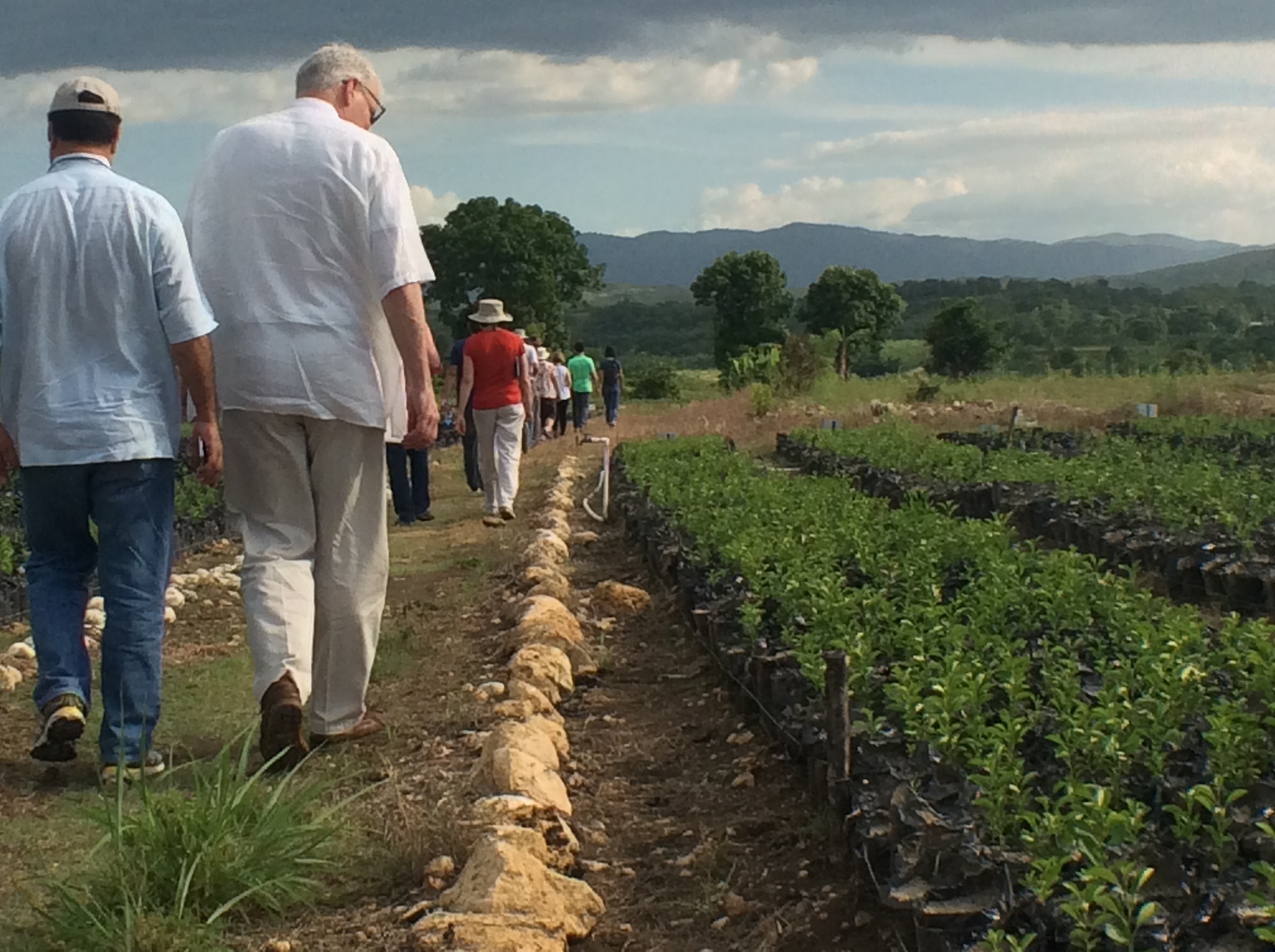PMIL meetings begin in Port-au-Prince, Haiti
By Christy Fricks
University of Georgia, Peanut & Mycotoxin Innovation Lab

PMIL researchers meet with local stakeholders, discuss research findings and priorities of mycotoxins, and visit local
peanut crops and businesses. The goal of this collaboration is to continue to improve the peanut value chain in Haiti
by evaluating current research, and building upon previous research conducted in Haiti from 2007 to 2012.

Dean J. Scott Angle of the University of Georgia College of Agricultural and Environmental Sciences visiting Haiti
with the Peanut & Mycotoxin Innovation Lab.

PMIL’s Haiti events began early Thursday morning June 11th, with a drive to the Central Plateau to visit
an Acceso Peanut Enterprise Corporation Depot, the Partners in Health (PIH) RUTF factory, and a peanut
nursery and research site.

The depot is situated in a remote farming village in the central plateau. Residents of the area rely almost solely on
farming for income.

Rob Johnson demonstrates aflatoxin field testing to Dr. Pat Wolff with Meds & Foods
for Kids and University of Georgia Assistant Dean Amrit Bart.

At the depot, Rob Johnson, General Manager of Acceso Peanut Enterprise Corporation, explained the credit
system that they use to allow farmers to purchase seed and then sell their crop back to the depot. Depot
managers are hired from the local community and trained to use FarmForce software and tablets. Each depot
manager is issued a tablet to sync information on credit, sales, projected yields, aflatoxin content and other
measures for each farmer participating in the program.

Farmers participating in the system receive education on safe and productive agricultural practices,
such as how to mitigate post-harvest aflatoxin. They also receive peanut seeds that have been tested
and proven to be a productive and profitable variety in the area.

The group also toured the Partners in Health RUTF factory near Mirebalais. The factory operates purely
from donations and distributes the RUTF produced through PIH’s clinics in the area. They also purchase
locally-grown peanuts from Acceso. In addition, Acceso contracts the facility to sort, shell and roast
peanuts for sale to the commercial sector.

Following this the group headed to a PMIL research field site. The plot is used by PMIL researchers to
evaluate new peanut varieties and various crop management practices.
Workshop on Priorities for Addressing Mycotoxins in Haiti
On June 12, PMIL hosted a successful workshop in Port au Prince, “Priorities for Addressing Mycotoxins in Haiti.” Over 40 participants attended, including members of the United States Agency for International Development (USAID), the Haitian Ministry of Agriculture, Natural Resources, and Rural Development (MARNDR), local government and private sector representatives, Haitian scientists, and members of the PMIL research team, as well as in-country collaborators.
Following opening remarks by Dave Hoisington (PMIL Director), Julia Kennedy (USAID/Haiti) and Vern Long (USAID/Washington), two presentations by Jamie Rhoads (PMIL Assistant Director) and Dan Brown (Cornell University) focused on what is the known about the health, safety and economic development risks associated with mycotoxins, especially regarding the status in Haiti.
Following these presentations, an invited panel of public and private sector participants briefly presented their thoughts on the priorities to address mycotoxins in Haiti. Panelists included Lemane Delva (FAMV, the state agriculture university), Jean Marc Ewald (PISA/REBO, a commercial peanut butter producer), Jagger Harvey (Biosciences East and Central Africa, a regional lab of excellence in Nairobi, Kenya), Rob Johnson (Acceso Peanut Enterprise Corporation) and Dan Brown.
In the open discussion that followed, involving all participants, there was strong concern and demand for options for alternative uses for the contaminated peanuts and other commodities, such as expressing for oil, livestock feed, or fuel. While feasible methods do exist to remove and detect contaminated commodities, without a viable alternative use of the discards, there would be little incentive for farmers, sellers, nor buyers to implement proper procedures uniformly. In a competitive, food-insecure market, this also presents a risk of concentrating highly contaminated discards into foods consumed by more vulnerable, less aware populations.
Other topics discussed included the need for more research on adoptable post-harvest technologies, on other mycotoxins than just aflatoxin (e.g., ochratoxin in sorghum), on what is the total dietary load of mycotoxins in a typical Haitian diet, and on creating more awareness of the problem and the possible solutions.
Several participants asked, “Is it safe to continue eating peanut butter produced in Haiti?” While the resounding answer was “yes,” all participants agreed that more research and education was needed to protect consumers and producers.
In the afternoon PMIL’s Haiti Value Chain project met to discuss the morning’s progress and began planning for the upcoming year.
Published June 14, 2015
